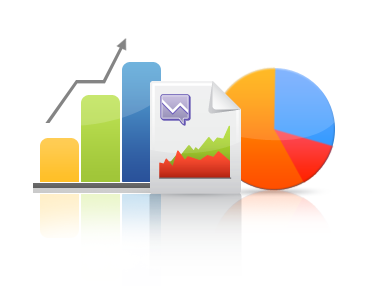BDaaS is growing by 31 percent. annually. In Poland only 5.9 percent of. companies are using Big Data
Businesses are increasingly recognizing the potential of data analytics, but do not necessarily want to invest in implementing their own Big Data tools – it’s a bigóone conclusion that comes to mind after reading the MarketsandMarkets report. This is well illustrated by the level of investment in cloud solutions – the market for Big Data as a Service is expected to grow by 2020. by as much as 31 percent. yearly.
There are two key issues in data analytics: finding the right connections between information and ultimately monetizing it, and the time it takes to do so. Data processing and delivery „on demand” Not only is it cheaper, but it is also much faster in the cloudóIn comparison to the scenario in whichówe build our own Big Data infrastructure from scratch.
Data as a service
The birth of data analytics implemented in the Big Data as-a-Service (BDaaS) system has been contributed to by the development of the Big Data as a serviceócloud computing technology. It is one of the pillars ofó0 on the horizon in the digital transformation of enterprises, whichóAccording to IDC, beacons are also accelerating in Poland. The second major factor in this process is the exponentially growing amount of data on the Internet, containing m.in. valuable informationóof enterprise operations, as well as the useróon the web. From the report „Data Never Sleeps 4.0” According to IDC, Internet users browse more than 159 thousand websites per minute. pages, publish 400 hours of materialóin video on YouTube and shared over 216 thousand. Facebook photos. Oracle predicts that by 2020 the global network will already exceed 45 Zettabytesóin the data. It’s a largely still undiscovered asset.
Standard static BI (Business Intelligence) systems present in medium and large enterprises are limited to processing data collected within the organization, while analysis of large unstructured setsóThe potential of data analytics is growing, but they don’t necessarily want to invest in implementing their own Big Data toolsóThe new solution is beyond their technological capabilities. Meanwhile, according to an expertóAccording to IDC, the success in the digital economy will be achieved by those companies thatóIn the next few years 7 out of 10 companies plan to increase the amount of data they process. By 2018, the flow of external digital information within enterprises is expected to increase fivefold, while digital transformation leaders are expected to increase the amount of outbound data by at least 500 times. In their processing, they are assisted by Big Data as-a-Service and DMP (Data Managing Platform) platforms, which can be used to analyze data in a variety of waysóThey not only analyze in the cloud computing data from multiple sources, but also provide the data that is stored in the cloudóThe biggest catalyst for this is the development of a new systemóin BI, CRM or ERP in real time.
Creating your own DMP platform inside your organization in most casesóIt is not cost-effective to. Purchase of infrastructure, implementation of software for Big Data analytics or employment of suitably qualified specialistsóin whichóIt is a time-consuming and expensive process. It is much easier to connect existing CRM, ERP or BI systems to the DMP platform, which processes data from the CRM systemóIt is not profitable to connectócloud computing resources. This solution relieves companies from the need to conduct tedious analyses and use outdated methods to make any use of data. Intelligent algorithms thatóThey use BDaaS solutions to automate and streamline analytical processes, help track down the source of the data, and improve the quality of the dataówill solve the problemóIn the Polish subcontinent, social media are used to create 360-degree profiles of customers, using anonymous data about Internet usersóThe digital economy will be a success for those companies that are.
Clash with reality
On the Polish subóHowever, Big Data analytics is still being neglected. According to a survey conducted by InsightExpress, as many as 8 out of 10 Polish managersóIT managers believe that Big Data will be at the core of their companies’ business strategies in the next five years. Over the next twoóIn the next few years, 7 out of 10 enterprises plan to increase spending onóIt is not cost-effective to analyze large sets of dataóin data. However, there are many indications that the native optimism ends with declarations for the time being. The research conducted by GłóThe data collected by companies from all over the world shows that for 72% of IT companies in the world, the data collected by the Central Statistical Office paint a sad picture of the red-and-white reality, in which the world’s IT companies are the only onesóas little as 5.9 percent of. companies are using big data analyticsóin the data. They most often use geolocation data (3.9 percent of the total number of users).) and information generated by social media (2.1%).). The research conducted by Intel shows that only one in five companies operating in Poland (18%) analyzes marketing information about their customers.) analyzes marketing information about their customers. However, this needs to change.
Polish companies are increasingly competing on the global market and in order to stay there, they need to focus on digital transformation, just like their competitors operating on developed markets. We are entering a period of profound change in the global marketplace, whichóThe biggest catalyst is the development of the systemój Big Data analytics. Fortunately, thanks to BDaaS services, this process does not have to be difficult and expensive. Companies are simply losing money by not tapping into the potential of data. This is perfectly visible for example in online advertising. Campaigns executed with the use of Big Data enjoy over 85% success rate. It is much easier to connect existing CRM, ERP or BI systems to the DMP platform, which processes data from CRM, ERP and BI systems. According to a survey of more than 400 professionals conducted by the Computing Technology Industry Association (CompTIA)óThe results of the survey of IT companies from all over the world show that for 72 percent of the. The most important catalyst is the development of the systemócloud computing for Big Data analytics has not only met their expectations, but exceeded them.


